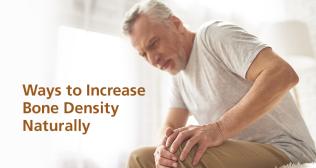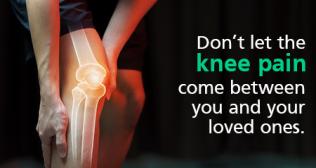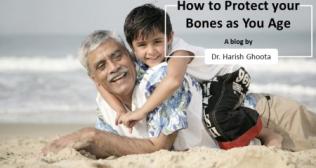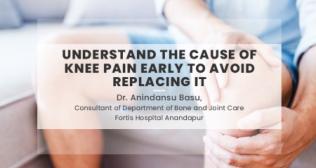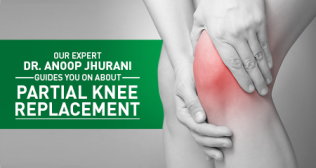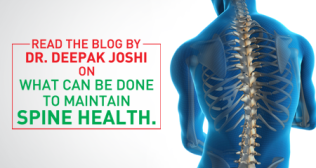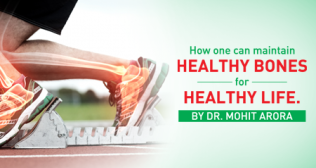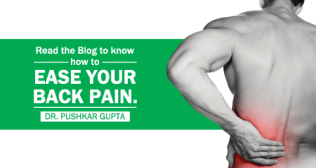
Orthopaedics
Knee Pain In The Young
Knee Pain In The Young Jul 16, 2014
 A few decades ago, joint pain was considered to be a normal part of ageing. It was considered to be an ailment that affected elderly people only, but in the recent times due to unhealthy lifestyle patterns more and more people are complaining of joint pain at a very young age
All knee pains are not arthritis. Although there is no particular age in which knee pain can occur but nowadays there are many young boys and girls who complain of knee pain. It is quite worrying for people as they think it might be the beginning of arthritis. They often correlate this with arthritic pain which elders in their family may be having. In medical terms this is called patella femoral knee syndrome.
This happens when your kneecap (patella) and cartilage in your joint is affected by imbalances in the muscles surrounding your knee. All the joints in our body have a smooth lining called cartilage. Knee joint is made of lower end of thigh bone, upper end of leg bone and knee cap which sits on the groove in the lower part of thigh bone. You might be complaining of pain or discomfort while negotiating stairs or some may complain of pain due to prolonged sitting in office.
Causes
We still haven’t understood all the causes of this pain syndrome. We believe it is multifactorial. That is why it is labelled as a syndrome and not a disease. We presume it could be due to weakness or imbalance in the muscles in front and back of your thigh.
Diagnosis
To diagnose this you need to visit an orthopaedic surgeon who would take a detailed history and examine your knee in an outpatient clinic. You may be asked to tighten your thigh muscles (quadriceps) while doctor holds your kneecap down. This will cause pain. It may present as swelling in the knee which may be obvious or subtle and will be picked up by a doctor only. Rarely are any blood tests needed but may occasionally be performed to rule out any surprises. The x-rays don’t show any cartilage and are not of much help. The magnetic resonance imaging (MRI)may be performed if symptoms persist or rule out any other cause of pain and it may also show the softening of the cartilage.
Treatment
The knee will get better by itself, without needing any specific treatment. It may take a while before your symptoms improve. Generally pain killers and assessment by physiotherapist and exercises to strength the muscles in front of thigh, back of thigh and inner side of thigh are of great help.
Doctors have also observed that people often don’t do exercises regularly and expect improvement. It may take two to three months to improve with a proper exercise regime under the supervision of a qualified physiotherapist and periodic regulation by your doctor.
A few decades ago, joint pain was considered to be a normal part of ageing. It was considered to be an ailment that affected elderly people only, but in the recent times due to unhealthy lifestyle patterns more and more people are complaining of joint pain at a very young age
All knee pains are not arthritis. Although there is no particular age in which knee pain can occur but nowadays there are many young boys and girls who complain of knee pain. It is quite worrying for people as they think it might be the beginning of arthritis. They often correlate this with arthritic pain which elders in their family may be having. In medical terms this is called patella femoral knee syndrome.
This happens when your kneecap (patella) and cartilage in your joint is affected by imbalances in the muscles surrounding your knee. All the joints in our body have a smooth lining called cartilage. Knee joint is made of lower end of thigh bone, upper end of leg bone and knee cap which sits on the groove in the lower part of thigh bone. You might be complaining of pain or discomfort while negotiating stairs or some may complain of pain due to prolonged sitting in office.
Causes
We still haven’t understood all the causes of this pain syndrome. We believe it is multifactorial. That is why it is labelled as a syndrome and not a disease. We presume it could be due to weakness or imbalance in the muscles in front and back of your thigh.
Diagnosis
To diagnose this you need to visit an orthopaedic surgeon who would take a detailed history and examine your knee in an outpatient clinic. You may be asked to tighten your thigh muscles (quadriceps) while doctor holds your kneecap down. This will cause pain. It may present as swelling in the knee which may be obvious or subtle and will be picked up by a doctor only. Rarely are any blood tests needed but may occasionally be performed to rule out any surprises. The x-rays don’t show any cartilage and are not of much help. The magnetic resonance imaging (MRI)may be performed if symptoms persist or rule out any other cause of pain and it may also show the softening of the cartilage.
Treatment
The knee will get better by itself, without needing any specific treatment. It may take a while before your symptoms improve. Generally pain killers and assessment by physiotherapist and exercises to strength the muscles in front of thigh, back of thigh and inner side of thigh are of great help.
Doctors have also observed that people often don’t do exercises regularly and expect improvement. It may take two to three months to improve with a proper exercise regime under the supervision of a qualified physiotherapist and periodic regulation by your doctor. 






